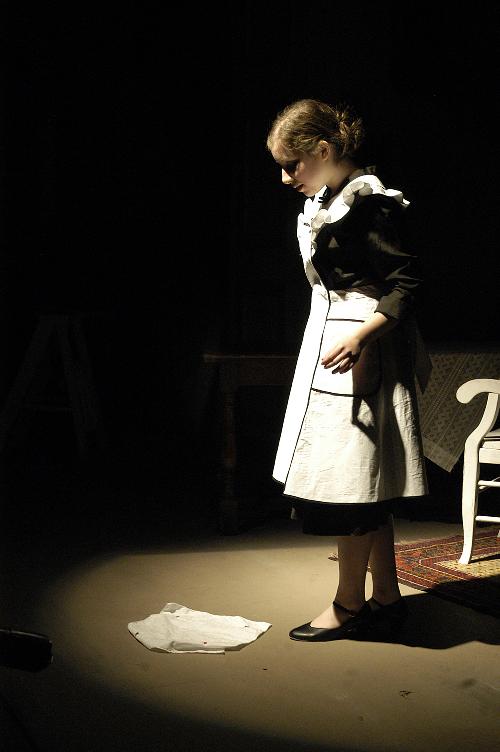DESDEMONA
LOCATION: Adams House Pool Theatre
DATE: Dec. 8-10
DIRECTOR: Rebecca J. Levy ’06
TECHNICAL DIRECTOR: Rebecca Eshbaugh ’07
A compelling twist on William Shakespeare’s tragic jealous-lover-turned-murderer story “Othello,” “Desdemona: A Play about a Handkerchief” features a comic cast of all female characters: Desdemona, her recently promoted chambermaid Emilia, and her friend Bianca, a local prostitute.
Pulitzer Prize-winning playwright Paula Vogel explores the actions and misunderstandings that precipitate the original work’s final tragedy—Othello’s murder of his wife Desdemona who he has been misled to believe is philandering—within the context of the emotional and social states of these three women.
In this Athena Theater Company (ATC) production, the characters hardly resemble their Shakespearean counterparts. Desdemona (Beth R. McLeod ’08), as opposed to being the faithful wife and innocent victim of her husband’s jealousy, emerges as a woman longing to live beyond the role of the traditional wife. She has turned to sleeping with the men of her husband’s company in an attempt to escape the confines of her existence.
Similarly, Emilia (Anna M. Resnick ’09) remains the loyal servant and wife, yet she is so embittered by the abuse of her husband Iago, that her decision to betray her mistress (with whom she also spars to comic effect) can be interpreted as a desperate attempt to find acceptance and emotional warmth. The play even manages to give Bianca (Julia C.W. Chan ’05), more dimension than that of an innocent whore; here, she is painted a desperate idealist, capable of more passion than her one-dimensional exterior amiability in the original work would have initially indicated.
As Desdemona, McLeod expresses the character’s loneliness and vivacity with a fitting sense of aristocratic entitlement. But it is Bianca who really makes an impression. Despite little stage time, Chan steals the spotlight and brings depth to Bianca by simultaneously expressing her exterior confidence and inner vulnerability, with more plausibility than the range of emotions attributed to such a flimsy character would initially suggest. Resnick also succeeds in channeling Emilia’s bitterness and repression, although, consequently, her character pales in comparison to the dynamism of the other two women. The most engaging moments, however, come when Bianca and Desdemona discourse onstage to comedic and then violent ends.
Director Rebecca J. Levy ’06 has guided the actresses to impacting portrayals that engage the audience in the characters’ psyches, giving the female figures a more substantiated human dimension than their Shakespearean counterparts. Unlike the Shakespearean play, “Desdemona” puts an empathetic focus an the unfortunate condition of these women, who have an inner potential that is beyond what their male-dominated world will allow.
Set designer Eric P.C. Phelan ’07, successfully evokes the surroundings that could trap these women and also, at the same time, allows enough space for the actors to be constant in action, breathing life into the play’s dialogue-propelled plot. The direction also stages the action to subtly imply its context of the character’s social conditions; a privileged Desdemona constantly lounges while the household-supporting wife Emilia toils away and Bianca freely enters and exits as a woman of her own will and self-defined pleasure.
This is not to say that the ATC production is without fault, however. Although they may have allowed more varied glimpses of the characters than a single act, the numerous scene changes grows tiresome as the play progresses, since the fully developed scenes would have been more wholly entertaining that these brief flashes of life.
But perhaps the most distracting production element was the music, which failed to sustain the dramatic tension or even complement the play’s overall tone. Instead, its strident entrances seemed to unnecessarily barge in with every set change and occasionally even clashed with the scene’s actual dialogue.
Yet these shortcomings are minor; and despite such distractions from the main showcase, the ATC production succeeds in its portrayal of a rarely considered, but nonetheless important, character perspective on a classic tragedy.
CORRECTION: The print and original online version of the Dec. 12, 2005 arts article "Vogel Production Impresses Despite Music" misspelled the name of Julia C.W. Chan '05.
Read more in Arts
Portrait: Tom Conley













